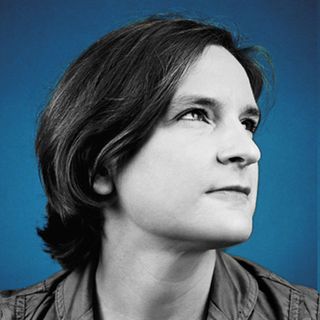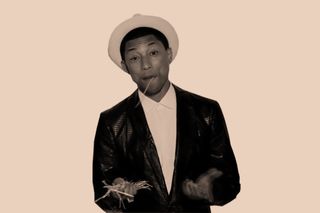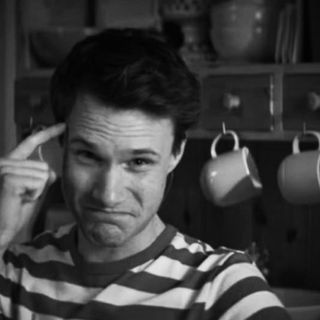
Pharrell Williams Took 6 Years to Denounce ‘Blurred Lines’ as Rapey
Better late than never, right?

In GQ’s inaugural New Masculinity Issue, cover star Pharrell Williams addresses the one piece of art that has marred his career forever: “Blurred Lines,” a 2013 chart-topper the rapper/producer/singer-songwriter recorded with Robin Thicke and T.I. At the time, the song drew widespread censure for its predatory/creepy lyrics: “You’re a good girl/ I know you want it,” and its music video, wherein naked or merkin-clad women made pouty faces and epitomized living, breathing sex props. At the time, Williams had told Pitchfork, “When you pull back and look at the entire song, the point is: She’s a good girl, and even good girls want to do things, and that’s where you have the blurred lines. … She expresses it in dancing because she’s a good girl. People who are agitated just want to be mad, and I accept their opinion.”
Six years later, Williams says he thinks differently. “I didn’t get it at first,” he says about the critique “Blurred Lines” received. “Because there were older white women who, when that song came on, they would behave in some of the most surprising ways ever. And I would be like, wow. They would have me blushing. So when there started to be an issue with it, lyrically, I was, like What are you talking about? There are women who really like the song and connect to the energy that just gets you up. And I know you want it — women sing those kinds of lyrics all the time. So it’s like, What’s rapey about that?”
Williams says he then realized the language he co-wrote for “Blurred Lines” is what men tend to use to take advantage of women, and “it doesn’t matter that it’s not my behavior. Or the way I think about things. It just matters how it affects women. And I was like, Got it. I get it. Cool. My mind opened up to what was actually being said in the song and how it could make someone feel. Even though it wasn’t the majority, it didn’t matter. I cared what they were feeling too. I realized that we live in a chauvinist culture in our country. Hadn’t realized that. Didn’t realize that some of my songs catered to that. So that blew my mind.” Williams also acknowledged that he was born in “a different era, where the rules of the matrix at that time allowed a lot of things that would never fly today,” adding “some of my old songs, I would never write or sing today. I get embarrassed by some of that stuff. It just took a lot of time and growth to get to that place.”
This candor has been lauded by mainstream media in the 24 hours since the GQ profile published, and while some of it is warranted, most of it is exaggerated. Does it help for someone of Pharrell’s status, popularity, and even goodwill to reckon with the consequences of problematic past work and say, ‘Yes, it took a while to understand why it was wrong and now I get it?’ Yes, 100%. But does this act of bare-minimum self-awareness need to be rewarded with gushing, adoring headlines? Please, no.
First, he vehemently defended the song in 2013 when people pointed out the exact same issue. The difference between now and then? The song was topping every pop chart in the world, and consequently awarding Williams, Thicke, and everyone else involved giant paychecks. As a consumer of Williams’ brand of wokeness, I have to question the motivations behind the timing of this admission — “Blurred Lines” has now been almost universally disparaged in retrospect, and it has cost Williams and Thicke almost US$5 million after Marvin Gaye’s family won a copyright infringement lawsuit alleging the song copied Gaye’s 1977 song “Got to Give It Up.” The song remains an unaddressed blot on Williams’ career, and now that denouncing “Blurred Lines” comes at no personal cost to him, he seeks to staunchly position himself against the kind of talk the song glorifies. And his words, while they do seem genuine, are just that — words; Williams seems to be keeping the money he earned from making and defending the song he now considers dangerous to society.
Related on The Swaddle:
Does It Hurt More When A Woke Feminist Bro Turns Out To Be A Predator?
But it seems his awareness did kick in — six years too late, but it did — and that has value. Celebrities denouncing problematic past works of art, especially their own, helps drive a progressive cultural conversation, one that consumers of pop culture are already having in the soundproof abyss that is Twitterverse. But the motivations and timing for these drivers are almost always suspect; it’s only when a certain work of art starts becoming unpopular or monetarily non-beneficial that artists come out of the woodwork to display their wokeness; when such art is reaping rewards, they gravitate toward defending the source of their wealth. By glorifying these brownie point-focused admissions of self-improvement, the media is rewarding celebrities for doing the bare minimum, which, in turn, becomes the standard of progressivism they show while everyone else goes back into shouting into the abyss.
Today, it’s incredibly easy to demonstrate wokeness; armed with the language and critique used by social justice advocates on social media, a celebrity can pose as woke, while not following up with work or actions that reflect this awareness. Aziz Ansari was the wokest Indian comedian — until the same wokeness exercised by his fans meant his celebrity was at risk; now he spends his time laying siege on those who criticize him. Selena Gomez, an advocate for sexual assault survivors and mental health, and producer of Netflix’s 13 Reasons Why, is now starring in accused rapist and child molester Woody Allen’s A Rainy Day. And then there are scores of white celebrity feminists who use their platform to peddle the kind of wokeness that is exclusively beneficial to them, such as Taylor Swift, Alyssa Milano and Meryl Streep.
Pharrell, in the GQ interview, talks about all sorts of privilege — race privilege, which he has always denounced, and male privilege, which he seems to be reckoning with. These woke assertions, then, also need to be looked at through a critical lens, especially keeping in mind celebrities’ habit of co-opting progressive rhetoric only at convenient moments that don’t pose a threat to their work or career. Having said that, I hope Pharrell uses this awareness in his future art; until then these are his own words to keep in mind:
“And there are a lot of men who recognize their privilege, and they use it for good. We’re such a capable species. We have the ability if we can just galvanize for good. The only thing we got to do is balance the scales. We have to understand power. And who has it.”
Rajvi Desai is The Swaddle's Culture Editor. After graduating from NYU as a Journalism and Politics major, she covered breaking news and politics in New York City, and dabbled in design and entertainment journalism. Back in the homeland, she's interested in tackling beauty, sports, politics and human rights in her gender-focused writing, while also co-managing The Swaddle Team's podcast, Respectfully Disagree.
Related


Sapiosexuals, It’s Not Revolutionary to Be Attracted to Intelligence
